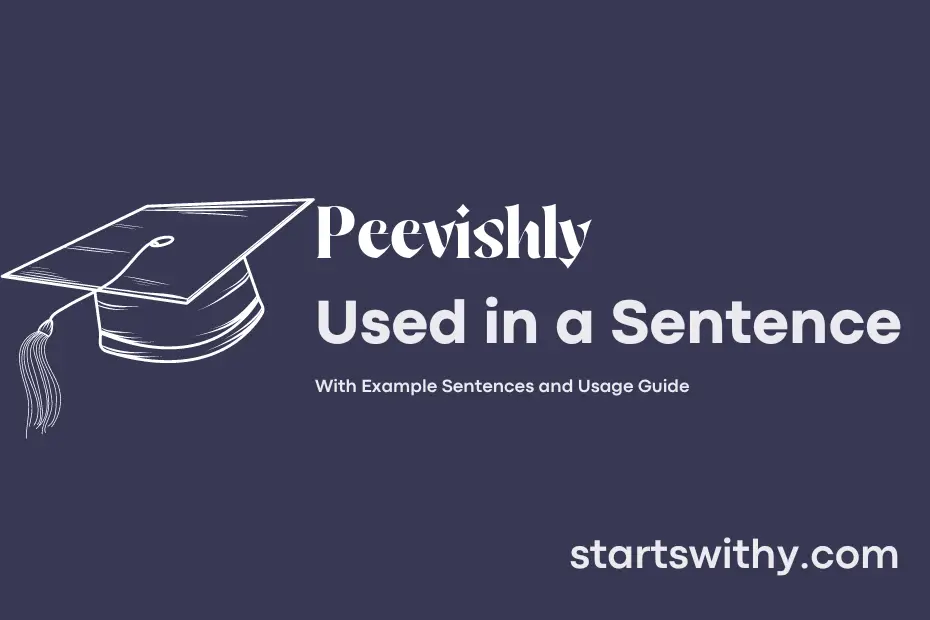Have you ever come across the term “peevishly” while reading or in conversation and wondered what it meant? Let’s delve into the meaning of this intriguing word.
“Peevishly” is an adverb that describes someone behaving in an irritable or discontented manner, often showing annoyance over trivial things. This word conveys a sense of petulance and irritability in someone’s actions or words.
7 Examples Of Peevishly Used In a Sentence For Kids
- She peevishly asked for more crayons.
- He peevishly crossed his arms when he didn’t get his favorite snack.
- The little girl peevishly stomped her foot when her friend took her toy.
- He peevishly complained about having to clean up his toys.
- The boy peevishly pouted when he lost the game.
- She peevishly told her brother to stop making noise.
- The children peevishly argued over who got to sit in the front row.
14 Sentences with Peevishly Examples
- Peevishly, she complained about having to wake up early for her morning class.
- The professor peevishly reminded the students about the upcoming deadline for their project.
- Peevishly, he refused to share his notes with his classmates.
- She peevishly criticized the cafeteria food, claiming it wasn’t up to her standards.
- Peevishly, he questioned the relevance of the assignment to the course material.
- The group of students peevishly argued over which topic to choose for their group presentation.
- Peevishly, she rolled her eyes when the librarian asked her to lower her voice.
- Peevishly, he muttered complaints about the slow internet connection in the college computer lab.
- She peevishly rejected the idea of attending the optional study session for the upcoming exam.
- The student peevishly slammed her textbook shut, frustrated with the complex math problem.
- Peevishly, he grumbled about the long lines at the college bookstore.
- The student peevishly challenged the professor’s grading on her essay.
- She peevishly demanded an extension on her assignment, claiming she had too many other deadlines.
- Peevishly, he refused to participate in the class discussion, claiming he had nothing to contribute.
How To Use Peevishly in Sentences?
Peevishly is used to describe someone who is easily irritated or annoyed. When using this word in a sentence, it is important to make sure that the context and tone match the meaning of the word.
Here is a simple guide on how to use peevishly in a sentence for beginners:
- Identify a situation where someone is expressing annoyance or irritation.
- Insert peevishly into the sentence in a way that accurately reflects the behavior of the person.
- Make sure the sentence flows smoothly and the meaning is clear.
For example:
– “She peevishly complained about the slow service at the restaurant.”
– “He responded peevishly to her constant questions.”
In these sentences, peevishly is used to describe the actions of the individuals who are showing signs of irritation or annoyance. By following this guide, beginners can effectively incorporate peevishly into their vocabulary and improve their ability to convey emotions in writing.
Remember to use peevishly sparingly and accurately, as it is a specific term that conveys a distinct mood or attitude. With practice, beginners can master the art of using this word in their communication effectively.
Conclusion
In essence, the various sentences with “peevishly” illustrate a tone of annoyance or irritability in communication. Whether it is a character in a story speaking peevishly, a person reacting peevishly to a situation, or someone making a request in a peevish manner, the use of this adverb conveys a sense of displeasure or discontent. By examining these examples, we can see how “peevishly” is employed to add depth to characters, evoke specific emotions, and highlight moments of tension.
Overall, the word “peevishly” serves as a valuable tool for writers and speakers alike to convey a particular mood or attitude in their communication. Its consistent use across different contexts showcases its versatility in portraying various shades of irritation, frustration, or petulance. Understanding the nuances of this word can enrich our comprehension of written and spoken language, allowing us to better interpret the emotions and intentions behind peevish statements.



